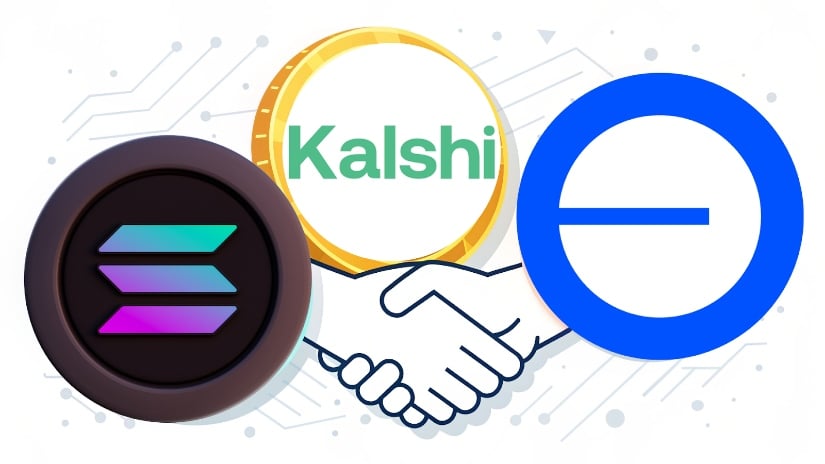The regulated prediction market platform Kalshi has announced the launch of KalshiEco Hub, a transformative initiative aimed at harnessing the power of blockchain technology through partnerships with Solana and Coinbase’s Base network. This strategic move seeks to foster innovation in prediction markets while attracting builders, traders, and content creators by providing grants, technical support, and marketing assistance.
Kalshi, recognized as the first CFTC-regulated prediction market platform in the U.S., allows users to place bets on the outcomes of real-world events ranging from political elections to crucial economic indicators. The launch of the KalshiEco Hub marks a significant expansion into the realm of blockchain development for the company.
The initiative leverages Kalshi’s regulatory experience and combines it with the blockchain capabilities of both Solana and Base. Solana is known for its rapid transaction speeds, capable of handling up to 65,000 transactions per second, while Base offers layer-2 scaling technologies to minimize costs and enhance processing speeds. The collaboration aims to create a robust ecosystem that bridges the gap between traditional finance and the burgeoning world of cryptocurrency.
Participants within the KalshiEco Hub will benefit from a variety of support services, including financial grants aimed at developers, as well as technical and marketing assistance for selected projects. Among the early collaborators are Kalshinomics—an analytics dashboard—and Verso, known for developing advanced trading tools.
In a further step towards integrating crypto financial solutions, Kalshi has also introduced native support for Solana (SOL) deposits, allowing users to fund their accounts directly from their wallets, with individual limits as high as $500,000. This enhancement builds on Kalshi’s existing support for cryptocurrencies like Bitcoin, USDC, and Worldcoin, in alliance with Zero Hash to ensure regulatory compliance.
This launch comes at a pivotal moment as Kalshi continues to close the trading volume gap with its chief competitor, Polymarket. Last month, Kalshi reported $875 million in trading volume, closely trailing Polymarket, which recorded $1 billion. The platform’s upward trajectory has been impressive, with monthly trading volumes that reached $13 million in early 2025, peaking at $26 million in October 2024. Revenues surged by a remarkable 1,220% in 2024, bolstered by the completion of a $185 million Series C funding round led by prestigious firms such as Paradigm and Sequoia, achieving a valuation of $2 billion.
The prediction market sector has garnered substantial interest from institutional investors. Reports indicate that Kalshi is in talks to raise additional capital, potentially increasing its valuation to $5 billion, while Polymarket recently secured $200 million with a valuation of $1 billion.
The partnership with Kalshi opens new use cases for Solana beyond its traditional roles in decentralized exchange trading and meme coins, which historically accounted for a significant share of the network’s trading volume. This integration allows holders of SOL to engage with prediction markets directly without the need to convert their assets to stablecoins, potentially enhancing on-chain demand and market depth.
This push coincides with a notable influx of institutional investment into Solana, which saw $1.4 billion from institutions in the second quarter of 2025. Public companies have staked 1.9 million SOL, valued at $320.4 million, and the total value locked in Solana’s DeFi ecosystem reached $8.6 billion, supported by the introduction of the first U.S. Solana staking ETF and increasing corporate treasury holdings.
Kalshi’s regulatory standing offers a competitive edge in an environment where prediction markets are facing increasing scrutiny at the state level. With CFTC approval across all 50 states, Kalshi presents a level of legitimacy that unregulated platforms lack, making it an attractive option for traditional investors and institutions. The company has recently appointed crypto influencer John Wang as head of crypto to enhance its digital asset engagement, alongside strategic collaborations with Robinhood and integration with World App for Worldcoin users.
Despite the clear potential, the regulatory landscape remains intricate. While prediction markets have gained traction during significant events such as the 2024 presidential elections, some states have issued cease-and-desist orders questioning the legitimacy of event contracts as financial instruments.
The launch of the KalshiEco Hub positions the platform at the forefront of regulated finance and blockchain innovation. With early partnerships focusing on analytics, trading infrastructure, and customer experiences, Kalshi may well set new benchmarks for regulatory-compliant decentralized finance as traditional finance continues to explore blockchain applications.
Prediction markets have consistently shown their accuracy during critical events, often exceeding traditional polling methods in their predictive capabilities. Kalshi data from late 2024 indicated a 91% probability that Bitcoin would reach $100,000 before the year’s end, emphasizing the platform’s ability to aggregate market sentiment effectively.
The success of Kalshi’s blockchain ecosystem initiative could pave the way for broader institutional acceptance of prediction markets while generating new utility for well-established networks like Solana and innovative platforms like Base. Ultimately, Kalshi’s strategic ventures represent a calculated investment in the future of blockchain-powered prediction markets, aiming to reconcile regulatory compliance with the dynamic landscape of cryptocurrency innovation.







